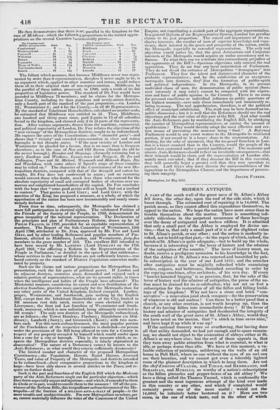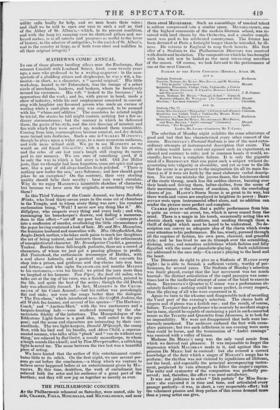MODERN ANTIQUES.
A PART of the south wall of the great nave of St. Alban's Abbey fell down, the other day, upon the roof of the side aisle, which it
burst through. The estimated cost of repairing it is 14,0001. The parish mean, as they cannot afford this expenditure themselves, to appeal to the nation. We hope the nation have more sense than to trouble themselves about the matter. There is something infi- nitely ridiculous in the perpetual recurrence of these howlings over the decay of antiquated and useless edifices. It is admitted
that only a small part of the Abbey is employed for divine ser- vice,—that is, that only a small part of it is of the slightest value to St. Alban's parish, or any other; and the nation is modestly in- voked, not to build up that part,—to the repair of which, indeed, the parish of St. Alban's is quite adequate,—but to build up the whole, because it is interesting to " the lover of history and the admirer of the antiquities of the country." The lover of history must, no doubt, receive a prodigious accession to his knowledge in the fact, that the Abbey of St. Alban's was renewed and beautified by pub- lic subscription in the year of our Lord 1832; and the searcher after antiquities must be mightily refreshed while examining arches, coignes, and buttresses, furnished according to order by
the copying-machines, alias architects, of his own day. If every
" howlet-haunted bigging" is so precious, that, for the sake of the lover of history and the admirer of antiquities, the purse of the na-
tion must be drained for its re-edification, why not set on foot a
subscription for the restoration of all the fallen and falling build- ings of the kingdom? Why not have a stone and brick " con- servative"—a renovation joint stock company—for the preservation
of whatever is old and useless ? Can there be a better proof that a church, or any other erection, is not worth keeping up, than the
fact of its having fallen into irremediable decay ? If the lover of history and admirer of antiquities had desiderated the integrity of the south wall of the great nave of St. Alban's Abbey, would they not have acted on the maxim, that " a stitch in time saves nine," and have kept it up while it was up? If the national treasury were so overflowing, that having done all that utility demanded, we had yet enough and to spare remain- ing, we should not object to the restoration of abbeys either at St. Alban's or anywhere else; but the evil of these appeals is, that they turn away public attention from what is essential, to what is
idle, or perhaps worse than idle. We have at this moment, a va- luable collection of paintings, mildewing on the walls of an old house in Pall Mall, where no one without the eyes of an owl can see their beauties, and we cannot get even a tolerably lighted room of the plainest description in which to hang them. Are not the chef dceuvres Of CLAUDE, and TITIAN, and REMBRANDT, and SEBASTIAN, and MURILLO, as worthy of a nation's subscriptions as the fallen pinnacles and pepper-boxes of an old abbey ? We have a thing called the Thames Tunnel, which is confessedly the greatest and the most ingenious attempt of the kind ever made in this country or any other, and which if completed would certainly prove one of the most useful : would not the 14,0001. be infinitely better bestowed on it ? Here are two- cases, in the one of which taste, and in the other of which utility calls loudly for help, and no man hears their voice; and shall we be told to open our ears to such a call as that. of the Abbey of St. Alban's,—which, in its present condition, and with the long ivy ramping over its shattered pillars and un- keyed arches, is to all intents and purposes as useful to the lover of history, to the admirer of antiquities, to the parish of St. Alban s, and to the country at large, as if both were erect and unfallen in all their original integrity ?




























 Previous page
Previous page